- Home
- Robin Hobb
Blue Boots Page 2
Blue Boots Read online
Page 2
Timbal lowered her eyes and watched her boots as he sang. His first song was a melancholy tale of love gone awry, with the maiden choosing wealth over fondness and regretting it evermore. His second song was the old one about the miller’s daughter floating notes down the river to her true love. His third song was one he had sung before. The refrain mentioned his true love’s raven hair, tiny hands, and deep blue eyes. She closed her eyes to listen to it, but was jolted out of her reverie. For in the last stanza, he sang not of her blue eyes, but of her blue boots. She lifted her gaze, shocked, but his face was calm, his eyes on his patron as he sang. If anyone else had noticed the change in lyrics, they did not react. She wondered if she had imagined it.
Azen sang two more songs before a signal from Lady Lucent declared the evening’s entertainment over. The minstrel rose from his seat and stepped away from his harp, lightly leaping down to advance on his patron and bid her good night. Timbal rose with the other maids and servants of the keep and followed them out of the hall into the warm evening. Light still lingered though it was fading fast. Tomorrow’s work meant another early morning for her. She went up to her room to get her ewer, and then strolled down to the well to fill it. She hummed as she went, the refrain of Azen’s last song still ringing in her head.
Gretcha was at the well before her, filling her own ewer. Timbal waited while she scooped handfuls of water to splash her face and finally to drink before eventually handing the bucket over to Timbal. The housemaid silently watched her lowering the bucket into the well. Timbal did not know her well, and was shocked by the note of resentment in her voice when the older girl spoke to her.
“Don’t let him make a fool of you, missy.”
“I’m sorry. What did you say?” The bucket plashed into the water.
“You heard me.” Gretcha was already turning away from her. “Don’t pretend to be stupid. The minstrel Azen. Yesterday, he asked me if I knew your name. I told him yes, that you were named ‘Trouble.’ And his name is the same for you. He’s toying with you. Don’t take him seriously. Surely your mother taught you that minstrels are never to be trusted? He’ll flirt with anyone, of course, and sleep with any girl who opens her legs to him after a few sweet words from that golden tongue. Enjoy it, if that’s the sort of girl you are. But don’t expect it to come to more than that. He’s Lady Lucent’s minstrel, and everyone who’s worked here more than a season knows that. But you’re new. So I thought I’d warn you. Just to be kind.”
“Thank you,” Timbal faltered, though the girl’s tone had been anything but kind. Gretcha made no response but turned and sauntered away, her filled ewer in hand.
As Timbal hauled the bucket up, to drink, and wash her face and then fill her own ewer, she wondered. Did Gretcha think that what she had said was a kind warning? Timbal doubted it. There had been jealousy in her voice, or something like it. Something nasty and vengeful. She wondered if somehow she’d made an enemy at Timberrock, but could think of nothing she’d done to Gretcha.
Nothing save draw Azen’s attention.
He’d asked Gretcha what her name was. That meant he’d noticed her as more than a face in the crowd. She smiled to herself. He might be Trouble, but she doubted he was trouble she couldn’t handle. She wondered if he’d been ‘Trouble’ to other serving girls and then nodded to herself.
Was that it? Had the minstrel once been attentive to the housemaid? Or was he truly, as Gretcha had accused him, a pastime for Lady Lucent? Lord Just’s legs were withered. Timbal wondered if that meant his other lower parts were useless. She had heard of highborn ladies and lords that did not keep their marriage vows but dabbled where they would. She thought again of how the lady summoned and then dismissed the minstrel, and wondered if she summoned and dismissed him for other duties as well. Were they secretly lovers, joined at the heart? She imagined the minstrel clasping the lady to his breast and kissing her. A strange thrill shot through her, one tinged with envy. Oh, she was being stupid! To have thought for one instant that she could have caught the eye, let alone the heart, of a handsome young minstrel like Azen! Of course he would be at his patron’s beck and call, performing whatever services she wished of him. Everyone knew that minstrels never truly gave their hearts. What had she been thinking? She filled her ewer and carried it back to her room.
Yet that night, despite her best efforts to clear her thoughts of him, she fell asleep still humming the refrain, with “blue boots” where “blue eyes” should have been. And the dream she had of him awoke her long before dawn, and did not allow her to easily fall asleep again.
Her love for him was like poison ivy, she thought. She rose early and went to her work, resolved not to allow her thoughts to touch on him. But they did. And with every touch of her mind, her infatuation spread and enflamed her. Infatuation, she told herself sternly. A silly little girl’s wild dream of a handsome and popular older man. What was wrong with her? He was the least eligible of the men in the keep. All he could do for her was break her heart, or get her pregnant if she were foolish enough to dally with him. Set him out of your thoughts and get about your work, girl!
So she told herself sternly and to absolutely no avail. Useless to recall that she knew next to nothing about him, and that what she did know indicated than any sensible girl would avoid him. He was a minstrel, and possibly the Lady Lucent’s lover. He had no fixed home, no income other than the largesse of his listeners, and probably few possessions other than the clothes on his back and his harp. The only thing she could share with him was trouble.
She was scrubbing the big iron stew pot when he came into the kitchen yard. It was the biggest pot the keep owned, and it was seldom empty. Once she was finished with it, it would be filled with water, onions, turnips, carrots, and a tough haunch from an old milk cow. It would cook for a day, and for the next week or so, more vegetables and pieces of meat would be tossed in to replace most of what was ladled out to the serving folk. Sometimes the soup kettle would go a month without a scrubbing out. And when it was finally time for a cleaning, it had to be rolled out of the kitchen onto the flagged court, where the lucky cleaner of the pot might spend half the morning scraping and scouring to get all the scorched scraps out of it.
Timbal had tied back her hair and covered her head with a rag. She’d turned the pot on its side and was on her hands and knees, with her head and shoulders inside the kettle, scraping away. Two small dogs had appeared from somewhere. Tails wagging, they awaited every handful of scraped-off debris, cheerfully snapping and snarling at each other to see who would claim it. In the midst of one of their yap fests, she heard her name in a questioning tone. “Yes?” she replied as she backed hastily out of the pot.
“Excellent,” Azen replied merrily. “I’ll see you then.” The minstrel swept her a theatrical bow that fluttered his blue summer cloak, and turned away from her.
“I don’t know what you asked me…” she called after him.
He turned around, walking backward away from her. He was smiling. “And yet you agreed? I call that a good sign for me!”
“Agreed to what?” She could not keep the smile from her face, even as she touched the greasy cloth that covered her hair, and wondered suddenly how foolish she had appeared to him, with her rear end sticking out of a soup pot.
“You agreed to walk out with me this evening, after your chores are done. I’ll meet you at the bottom of your stair.” He had not paused in moving away from her. Now he turned and walked rapidly away.
“Don’t you have to sing tonight?” she called after him.
He spun around once, laughing. “Only if you want me to!” he replied. “It’s my night to do as I please,” he added, and then he turned a corner and disappeared behind the milk shed. She stared after him. Her heart was hammering, the kettle scraper in her hand forgotten. What did it mean? For a time she remained crouched on her haunches, staring after him, her task forgotten. Should she go? She had said she would. But she had said “yes” before she knew what he was aski
ng, or even who was speaking to her. She hadn’t really said “yes” at all! Would she have, if she had emerged from the pot and heard what he was asking her? Of course not! She had decided he was not for her. Aninstant later, she admitted the truth to herself. Yes. She would have.
And she had.
It seemed Cook gave her every dirty and disgusting task the kitchen offered for the rest of that day. When finally the day’s work was done, she was greasy and sooty and bone weary from scrubbing. Any other night, she would probably have gone straight to her bed. Instead, she hurried down to the women’s bathhouse. She scrubbed herself there and washed tangles and grease from her hair. She wrung out her hair and knotted it up on the back on her head, and hurried back to her room. Unfortunately, Azen was already waiting at the foot of the stairs. He arched his brows in surprise at her dripping hair. “Just a moment!” she assured him, flustered beyond words, and fled up the rickety steps.
She changed hastily out of her servant’s dress and into the only “good” clothes she owned. Her skirt was green with white trim, and her blouse was pale yellow. As she fastened the simple silver hoop earrings that her father had given her on her sixteenth birthday, he was very much on her mind. What would he have thought of what she was doing now? Would he have approved of her walking out with a minstrel? For an instant, sadness washed over her that she could not ask his permission or opinion. She wondered what had become of their old cart and team, and if the men who had killed her father had profited from his death. Then she shook her head clear of such thoughts. They had never helped her, not in the days right after his death and certainly not now. She would have to make her own way in the world, and live with her own decisions.
She tore a comb through her dark hair, braided it, and pinned it up, hoping the wet would not be so noticeable. She pulled on her blue boots, took a breath, and left her small room to descend the stairs. Thoughts of her father had driven some of the giddiness from her. If she made any mistake with this man, she reminded herself, she’d have no one to rely on except herself.
She cautioned herself to wariness, but as she came down the steps, Azen was looking up and smiling at her. His dark eyes seemed suddenly a pool that she might drown in. “There you are!” he exclaimed, as if completely surprised by her presence. He lifted a small covered basket from the ground and hung it on one arm while offering her his free one. It seemed only natural to take it, and once she had, she could think of no polite way to let go of it. “I know a place where the night birds sing,” he told her, and off they went.
She did not have to talk much at first, for which she was grateful. He entertained her with an accounting of his day, turning his simple tasks to a tale full of humor and mischief. She could not help but laugh, and for a time, he seemedto expect no more from her save that she listen and smile at his nonsense.
The place where the night birds sang proved to be a sandy river beach backed by trees, downstream from the footbridge to town. Where the forest met the shore, he found a bleached-out log for them to sit on. The sun was making its lazy journey toward the horizon, sending the forest shadows reaching toward them. His little basket held a large honey cake for them to share and a bottle of wine. He used his sheath knife to pull the cork, doing it badly. “It will never go back in,” he told her gravely. “We’ll have to drink it all here, or waste it.”
“No more than a glass for me,” she demurred, only to discover that he had forgotten to bring any sort of cups for them. He offered her first drink from the bottle, which she shyly accepted, and then made her blush when he smiled slyly before he drank, saying it would be his first taste of her lips. She knew he was altogether too glib and that she should take warning from his clever way with words rather than be charmed by it.
But she was seventeen.
When the bottle of wine was half-gone in shared sips, he began to draw her out with questions, and though she tried valiantly to tell the tale of how she had come to be alone in the world in a calm manner, her throat closed and her eyes filled with tears when she spoke of her father. She looked down at her blue boots, and then reached down to touch them as if by doing so she could remember the touch of his hands when he’d given them to her. That was when Azen put his arm around her. He said nothing, but simply held her for a moment. And when her tears broke forth, he gathered her into his arms and let her cry.
She could not have said how or when she ended up in his lap, leaning her head on his shoulder. Nor did she really know when drying her tears changed to kissing her mouth. His lips held her as firmly as his arms. Perhaps she was not as alone in the world as she had thought. Evening and the forest shadow cloaked them from all eyes. She let him kiss her, and listened only to his sweet murmurs and the language of his knowing hands.
He never asked her if she would and so she never told him no or yes. She did not tell him it was her first time, but he knew, for he spun her a golden string of words and glistening kisses, telling her that opening a woman for the first time was like opening a wonderful bottle of wine, and that the first sip was to be savored slowly. His words formalized his touches, banishing any thoughts of resistance or reluctance. He promised her delight and he delivered it. She did not wonder then if his words were too practiced and his touches too deft. She did not wonder then how many other women he had opened.
In the depths of the night, they walked slowly back to the keep. There was enough moon to silver the road before their feet. He hooked her hand through the crook of his arm and she trusted him to guide her home. They were more than halfway there when she began to wonder what the morrow would bring. She tried to frame a question around her sudden uncertainty.
“What does it mean, to you?” she asked him.
“What does what mean?”
“Tonight, and what we did.” She wished she had his gift for words. She spoke so bluntly, she felt as if she threw rocks of question at him.
He was silent for a time. “Something like that means more than can be put into words,” he said at last. She tried to take comfort in that answer, but suddenly she wished he would try to put it into words.
“What do I mean to you, I mean? What do we mean to each other?”
“I think that, as time goes by, that is something we will discover,” he said easily. “I do not think we should worry about it on a night like this. This is a time to savor the moment, blue boots, not map out all of our lives.”
“Spoken like someone who cannot get pregnant,” she said, and then wished with all her heart that she could call those words back. Like a hammer, they broke the fragile bubble that had contained the moment.
He was quiet for a time and then said stiffly, “I have heard that women seldom conceive on their first time.”
“Except when they do,” she replied morosely. She had shattered whatever magic they had made. Now she was suddenly aware that she ached in new places, and that until she bled again, she must fret and fear. The possible consequences that might befall her from this one night loomed large, as did all the consequences of what might not befall her. What had she ever imagined it might mean? That the minstrel loved her, that he would marry her and share his life with her, take care of her if she were ill, help to raise their children?
“Let’s not worry about that right now,” he suggested, and she wondered what worry he referred to. She did not let go of his arm. It suddenly seemed to her that it might be as much of him as she would ever hold. The road was uneven and she tried not to lurch against him as they walked. The inference that Gretcha had made days ago came back to haunt her suddenly. Was he the lady’s plaything? She suddenly longed to ask him if he loved another, if he was bound in some way to the lady.
She bit back that question and instead asked him, “If I asked you something important, would you feel bound to speak the truth to me?”
He laughed, and she was shocked.
“Why do you laugh?” She tried to keep the hurt from her voice.
“Because, without intending, you have nearly s
poken the words of the old curse that used to be hurled by one minstrel at another. ‘May your tongue be tied to the truth!’ they used to curse, and a fearsome curse it was.”
“And why was that?”
“Because while we are the keepers of record, and must be meticulously honest and correct about what land was ceded or sold, or the year a couple was wed, or what agreement was made between two nobles, we are also the keepers of dreams. There are times when we must flatter and lie, in order to earn our bread. Heroes become stronger, queens more beautiful, and quests more dangerous when we sing them. So, to curse a fellow minstrel to have his tongue tied to the truth was to condemn him to live a life of frugality, depending only on what he could earn as a record keeper rather than what he might spin for himself by singing dreams to others.”
Perhaps she heard in his words more than he meant to tell her. For it seemed to Timbal that he had spun a dream for her that night, a tale that perhaps she was not so alone, and in return she had paid him with the coin that a woman can only spend once. Her virginity was gone, and she knew that to some men, that would matter a great deal when it came time to broker a marriage. She suddenly saw that of the small store of things she possessed, first knowledge of her body had been a good she hadn’t counted. Now she had given it to him, and though they had both enjoyed the experience, he was not bound to her by it. She would never be able to look her husband in the face and say, “Never have I known any man but you.” That was gone, carried off by the golden tongue of a minstrel.
It seemed useless to rebuke him with that. Doubtless he thought it no more than she owed him for a honey cake, some wine, and some sympathy. He would not understand what he had taken from her. She sighed and he told her, “Cheer up. We are not so far from the keep and your bed.”
At the foot of the stair he paused, holding on to her hand. The few torches that still burned outside the keep were but nubs in their sconces. She could scarcely see his face.

 Ship of Destiny
Ship of Destiny Golden Fool
Golden Fool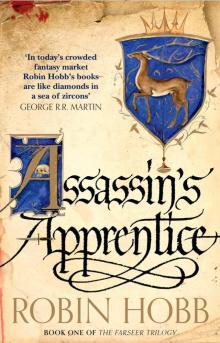 Assassins Apprentice
Assassins Apprentice The Dragon Keeper
The Dragon Keeper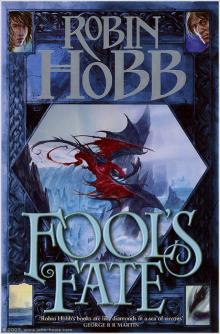 Fools Fate
Fools Fate Fools Errand
Fools Errand Fools Assassin
Fools Assassin The Mad Ship
The Mad Ship Shamans Crossing
Shamans Crossing Ship of Magic
Ship of Magic City of Dragons
City of Dragons Dragon Haven
Dragon Haven Fools Quest
Fools Quest Blood of Dragons
Blood of Dragons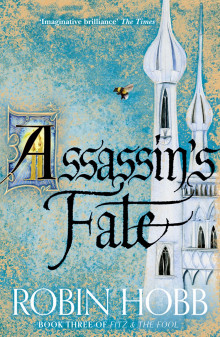 Assassin's Fate
Assassin's Fate Assassins Quest
Assassins Quest Renegades Magic
Renegades Magic Forest Mage
Forest Mage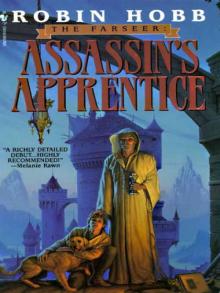 Assassin's Apprentice tft-1
Assassin's Apprentice tft-1 Assassin's Quest tft-3
Assassin's Quest tft-3 Royal Assassin
Royal Assassin Assassin's Apprentice (The Illustrated Edition)
Assassin's Apprentice (The Illustrated Edition) Assassin's Quest (UK)
Assassin's Quest (UK) Royal Assassin (UK)
Royal Assassin (UK) FF3 Assassin’s Fate
FF3 Assassin’s Fate Royal Assassin tft-2
Royal Assassin tft-2 Fool’s Assassin: Book One of the Fitz and the Fool Trilogy
Fool’s Assassin: Book One of the Fitz and the Fool Trilogy Fool's Fate ttm-3
Fool's Fate ttm-3 The Golden Fool ttm-2
The Golden Fool ttm-2 The Liveship Traders Series
The Liveship Traders Series The Wilful Princess and the Piebald Prince
The Wilful Princess and the Piebald Prince City of Dragons rwc-3
City of Dragons rwc-3 The Tawny Man 1 - Fool's Errand
The Tawny Man 1 - Fool's Errand Words Like Coins
Words Like Coins The Complete Tawny Man Trilogy Omnibus
The Complete Tawny Man Trilogy Omnibus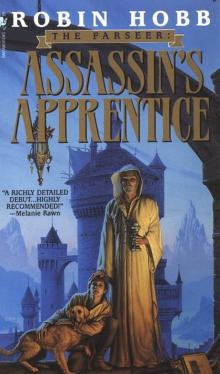 Farseer 1 - Assassin's Apprentice
Farseer 1 - Assassin's Apprentice The Complete Farseer Trilogy Omnibus
The Complete Farseer Trilogy Omnibus The Soldier Son Trilogy Bundle
The Soldier Son Trilogy Bundle Fool's Errand ttm-1
Fool's Errand ttm-1 Blue Boots
Blue Boots Shaman's Crossing ss-1
Shaman's Crossing ss-1 Mad Ship
Mad Ship Dragon Keeper
Dragon Keeper The Willful Princess and the Piebald Prince
The Willful Princess and the Piebald Prince Ship of Destiny tlt-3
Ship of Destiny tlt-3 Rain Wild Chronicles 02 - Dragon Haven
Rain Wild Chronicles 02 - Dragon Haven The Dragon Keeper trwc-1
The Dragon Keeper trwc-1 The Triumph
The Triumph Dragon Keeper Free Edition with Bonus Material
Dragon Keeper Free Edition with Bonus Material Mad Ship tlt-2
Mad Ship tlt-2 The Inheritance and Other Stories
The Inheritance and Other Stories Tawny Man 02 - Golden Fool
Tawny Man 02 - Golden Fool Farseer 2 - Royal Assassin
Farseer 2 - Royal Assassin Rain Wilds Chronicles
Rain Wilds Chronicles Forest Mage ss-2
Forest Mage ss-2 Ship of Magic lt-1
Ship of Magic lt-1 Renegade's Magic ss-3
Renegade's Magic ss-3